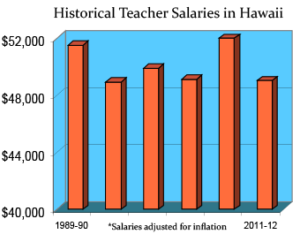Hawaii Teaching Salaries and Benefits

Most teachers have two major concerns in their lives: their students and their families.
While many student concerns may be solved through effective classroom practices and communication, family concerns often rest in the financial domain. What will happen to my family and me when I retire? What will we do if there’s a medical emergency?
The nearly 13,000 teachers in Hawaii are able to answer these questions more confidently, thanks to a substantial benefits system available to employees in the state. As a teacher in Hawaii, you’ll not only earn a competitive salary, but will rest easier knowing that you and your family are adequately covered by the state’s retirement and healthcare system.
Learn more about becoming a teacher. Contact schools offering teacher education/certification programs in Hawaii.
Teacher Salaries in Hawaii by Education
Hawaii uses a different pay scale than many other states in the country. Salary increases are bargained by the teacher’s union at the beginning of each contract period. This means there is no set pay raise with experience. The Hawaii Department of Education offers the following entry-level salaries to teachers in the state:
| Experience | Bachelor’s | Master’s |
|---|---|---|
| Step One | $32,222 | $34,799 |
| Step Five | $42,509 | $45,909 |
Source: Hawaii Department of Education
Retiring in Hawaii
Teachers in Hawaii will be able to enjoy its tropical beaches and scenic landscapes well into retirement thanks to the monthly benefits they receive. After enrolling in a Hawaii public school, you’re entered into the Employee’s Retirement System (ERS), which administers all retirement benefits for public employees.
The ERS offers teachers a hybrid retirement plan, where both teachers and their employers contribute a portion of compensation to a pension fund. As a teacher, you’ll contribute 8% of your monthly base salary to the fund, while your employer contributes 15%.
Your contribution will be credited to your ERS account, where it will earn interest at a rate of 2%. These funds may be withdrawn upon normal retirement to supplement the monthly benefits you’ll receive.
In Hawaii, teachers may retire normally if they meet the following qualifications:
- Age 65 with 10 years of service
- Age 60 with 30 years of service
Your monthly retirement benefits will depend on several factors, including how many years of service you’ve accrued and your final average salary. To discover your likely benefits, use the following formula:
Years of Service
multiplied by
1.75%
multiplied by
Average Final Compensation
So, for example, if you taught for 20 years and retired with a final average salary of $40,000, you would receive a monthly benefit of $1,166.
Planning for retirement is an intimidating process, and you may feel overwhelmed when you consider the options that are available to you upon retirement. Fortunately, the ERS provides teachers with several educational workshops and pre-retirement counseling sessions to clear up any confusion.
By attending these services, you can better plan for your future retirement. If you want to learn more about the Hawaii ERS and other retirement benefits available to you, contact the Employee’s Retirement System.
Access to Affordable Health Insurance
Due to ever-increasing fees, healthcare has become a major concern for most Americans. However, for teachers in Hawaii, these fees are kept at a manageable level with the help of health insurance benefits offered to educators.
Hawaii offers its teachers and their families access to the Employer Union Health Benefits Trust Fund, ensuring they’re adequately prepared for medical concerns.
In Hawaii, you’ll choose between several health care plans, including:
Preferred Provider Organization Plan
In the PPO plan, you’ll have more flexibility in choosing where you receive your care, gaining access to both in-network and out-of-network providers. With a PPO plan, you’ll pay higher deductibles for out-of-network providers.
Health Maintenance Organization Plan
Under the HMO plan, you must obtain care from in-network providers; out-of-network providers are not covered except in emergency circumstances.
High Deductible Health Plan
The high deductible plan offers similar benefits as the PPO plan, except it comes with a larger calendar year deductible.
Under each plan, you’ll also have the option to include your spouse and any children under the age of 26. With comprehensive health coverage, you’ll ease any concerns about the wellbeing of your family.
Each plan offers varying rates and levels of coverage, but include many similar services. Some typical services covered under the Employer Union Health Benefits plan include:
- Primary Care Visits
- Prescription Drug Care
- Physical Examinations
- Mammograms
- Maternity Services
- Inpatient Hospital Services
- Outpatient Services
- Mental Health Services
If you’re interested in learning more about the health benefits you’ll receive as a teacher in Hawaii, explore your health insurance options.








